Dispassionate or Passionate: Lawyers' Role in Client Advocacy?
VerifiedAdded on 2022/11/23
|6
|2531
|190
Essay
AI Summary
This essay delves into the multifaceted role of lawyers in representing their clients, questioning whether their approach should be dispassionate or passionate. It examines the professional obligations of lawyers, including their duty to the court, the administration of justice, and the importance of pro bono work. The essay addresses criticisms of the commercialization of the legal profession and explores the tension between profit and professional ethics. It further discusses the lawyer's duty of confidentiality, competency, and the regulatory frameworks governing the legal profession, with a focus on maintaining ethical standards and public expectations. The importance of balancing compassion with professional boundaries and the need for continued efforts to ensure access to justice for all, including pro bono services, are also highlighted.
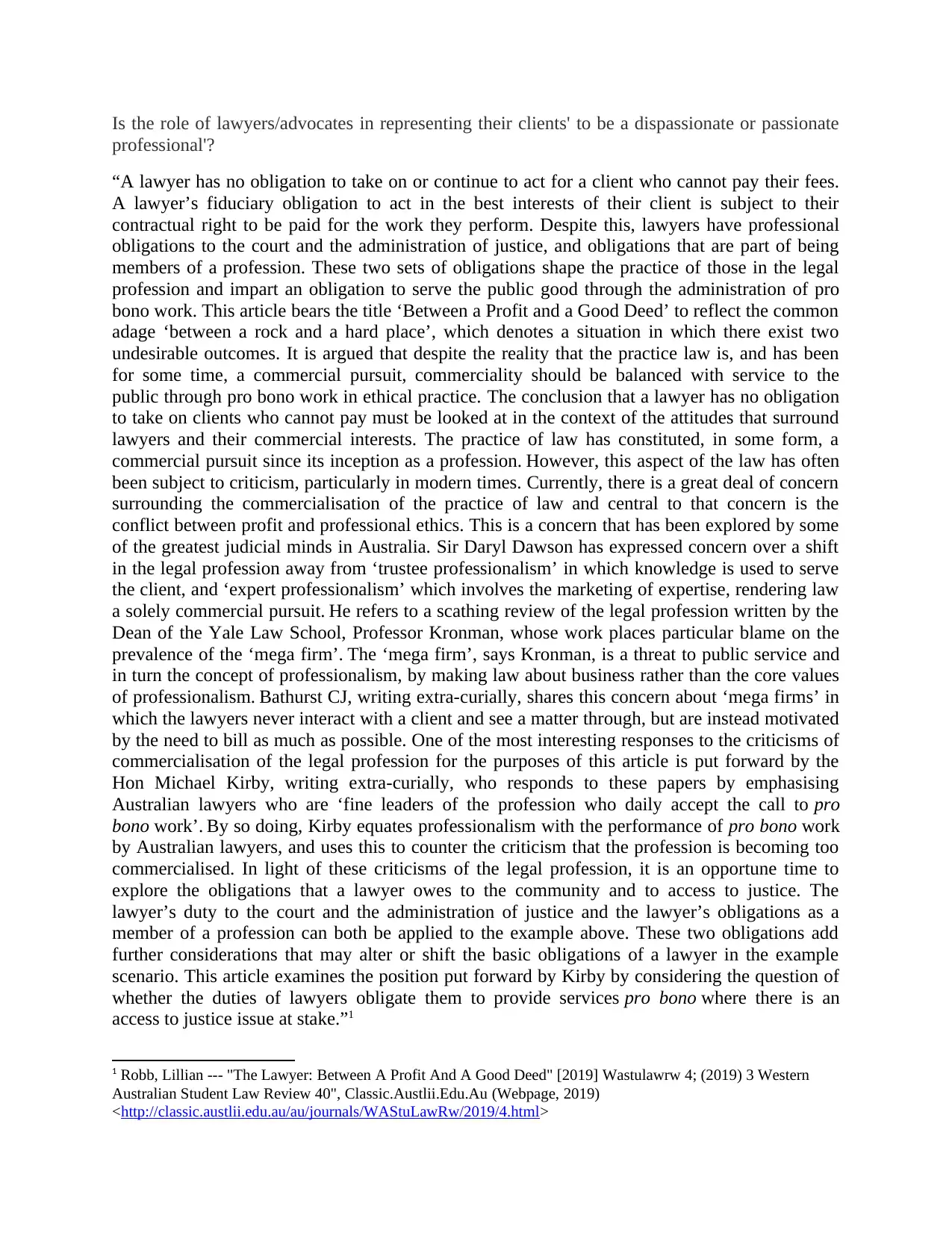
Is the role of lawyers/advocates in representing their clients' to be a dispassionate or passionate
professional'?
“A lawyer has no obligation to take on or continue to act for a client who cannot pay their fees.
A lawyer’s fiduciary obligation to act in the best interests of their client is subject to their
contractual right to be paid for the work they perform. Despite this, lawyers have professional
obligations to the court and the administration of justice, and obligations that are part of being
members of a profession. These two sets of obligations shape the practice of those in the legal
profession and impart an obligation to serve the public good through the administration of pro
bono work. This article bears the title ‘Between a Profit and a Good Deed’ to reflect the common
adage ‘between a rock and a hard place’, which denotes a situation in which there exist two
undesirable outcomes. It is argued that despite the reality that the practice law is, and has been
for some time, a commercial pursuit, commerciality should be balanced with service to the
public through pro bono work in ethical practice. The conclusion that a lawyer has no obligation
to take on clients who cannot pay must be looked at in the context of the attitudes that surround
lawyers and their commercial interests. The practice of law has constituted, in some form, a
commercial pursuit since its inception as a profession. However, this aspect of the law has often
been subject to criticism, particularly in modern times. Currently, there is a great deal of concern
surrounding the commercialisation of the practice of law and central to that concern is the
conflict between profit and professional ethics. This is a concern that has been explored by some
of the greatest judicial minds in Australia. Sir Daryl Dawson has expressed concern over a shift
in the legal profession away from ‘trustee professionalism’ in which knowledge is used to serve
the client, and ‘expert professionalism’ which involves the marketing of expertise, rendering law
a solely commercial pursuit. He refers to a scathing review of the legal profession written by the
Dean of the Yale Law School, Professor Kronman, whose work places particular blame on the
prevalence of the ‘mega firm’. The ‘mega firm’, says Kronman, is a threat to public service and
in turn the concept of professionalism, by making law about business rather than the core values
of professionalism. Bathurst CJ, writing extra-curially, shares this concern about ‘mega firms’ in
which the lawyers never interact with a client and see a matter through, but are instead motivated
by the need to bill as much as possible. One of the most interesting responses to the criticisms of
commercialisation of the legal profession for the purposes of this article is put forward by the
Hon Michael Kirby, writing extra-curially, who responds to these papers by emphasising
Australian lawyers who are ‘fine leaders of the profession who daily accept the call to pro
bono work’. By so doing, Kirby equates professionalism with the performance of pro bono work
by Australian lawyers, and uses this to counter the criticism that the profession is becoming too
commercialised. In light of these criticisms of the legal profession, it is an opportune time to
explore the obligations that a lawyer owes to the community and to access to justice. The
lawyer’s duty to the court and the administration of justice and the lawyer’s obligations as a
member of a profession can both be applied to the example above. These two obligations add
further considerations that may alter or shift the basic obligations of a lawyer in the example
scenario. This article examines the position put forward by Kirby by considering the question of
whether the duties of lawyers obligate them to provide services pro bono where there is an
access to justice issue at stake.”1
1 Robb, Lillian --- "The Lawyer: Between A Profit And A Good Deed" [2019] Wastulawrw 4; (2019) 3 Western
Australian Student Law Review 40", Classic.Austlii.Edu.Au (Webpage, 2019)
<http://classic.austlii.edu.au/au/journals/WAStuLawRw/2019/4.html>
professional'?
“A lawyer has no obligation to take on or continue to act for a client who cannot pay their fees.
A lawyer’s fiduciary obligation to act in the best interests of their client is subject to their
contractual right to be paid for the work they perform. Despite this, lawyers have professional
obligations to the court and the administration of justice, and obligations that are part of being
members of a profession. These two sets of obligations shape the practice of those in the legal
profession and impart an obligation to serve the public good through the administration of pro
bono work. This article bears the title ‘Between a Profit and a Good Deed’ to reflect the common
adage ‘between a rock and a hard place’, which denotes a situation in which there exist two
undesirable outcomes. It is argued that despite the reality that the practice law is, and has been
for some time, a commercial pursuit, commerciality should be balanced with service to the
public through pro bono work in ethical practice. The conclusion that a lawyer has no obligation
to take on clients who cannot pay must be looked at in the context of the attitudes that surround
lawyers and their commercial interests. The practice of law has constituted, in some form, a
commercial pursuit since its inception as a profession. However, this aspect of the law has often
been subject to criticism, particularly in modern times. Currently, there is a great deal of concern
surrounding the commercialisation of the practice of law and central to that concern is the
conflict between profit and professional ethics. This is a concern that has been explored by some
of the greatest judicial minds in Australia. Sir Daryl Dawson has expressed concern over a shift
in the legal profession away from ‘trustee professionalism’ in which knowledge is used to serve
the client, and ‘expert professionalism’ which involves the marketing of expertise, rendering law
a solely commercial pursuit. He refers to a scathing review of the legal profession written by the
Dean of the Yale Law School, Professor Kronman, whose work places particular blame on the
prevalence of the ‘mega firm’. The ‘mega firm’, says Kronman, is a threat to public service and
in turn the concept of professionalism, by making law about business rather than the core values
of professionalism. Bathurst CJ, writing extra-curially, shares this concern about ‘mega firms’ in
which the lawyers never interact with a client and see a matter through, but are instead motivated
by the need to bill as much as possible. One of the most interesting responses to the criticisms of
commercialisation of the legal profession for the purposes of this article is put forward by the
Hon Michael Kirby, writing extra-curially, who responds to these papers by emphasising
Australian lawyers who are ‘fine leaders of the profession who daily accept the call to pro
bono work’. By so doing, Kirby equates professionalism with the performance of pro bono work
by Australian lawyers, and uses this to counter the criticism that the profession is becoming too
commercialised. In light of these criticisms of the legal profession, it is an opportune time to
explore the obligations that a lawyer owes to the community and to access to justice. The
lawyer’s duty to the court and the administration of justice and the lawyer’s obligations as a
member of a profession can both be applied to the example above. These two obligations add
further considerations that may alter or shift the basic obligations of a lawyer in the example
scenario. This article examines the position put forward by Kirby by considering the question of
whether the duties of lawyers obligate them to provide services pro bono where there is an
access to justice issue at stake.”1
1 Robb, Lillian --- "The Lawyer: Between A Profit And A Good Deed" [2019] Wastulawrw 4; (2019) 3 Western
Australian Student Law Review 40", Classic.Austlii.Edu.Au (Webpage, 2019)
<http://classic.austlii.edu.au/au/journals/WAStuLawRw/2019/4.html>
Paraphrase This Document
Need a fresh take? Get an instant paraphrase of this document with our AI Paraphraser
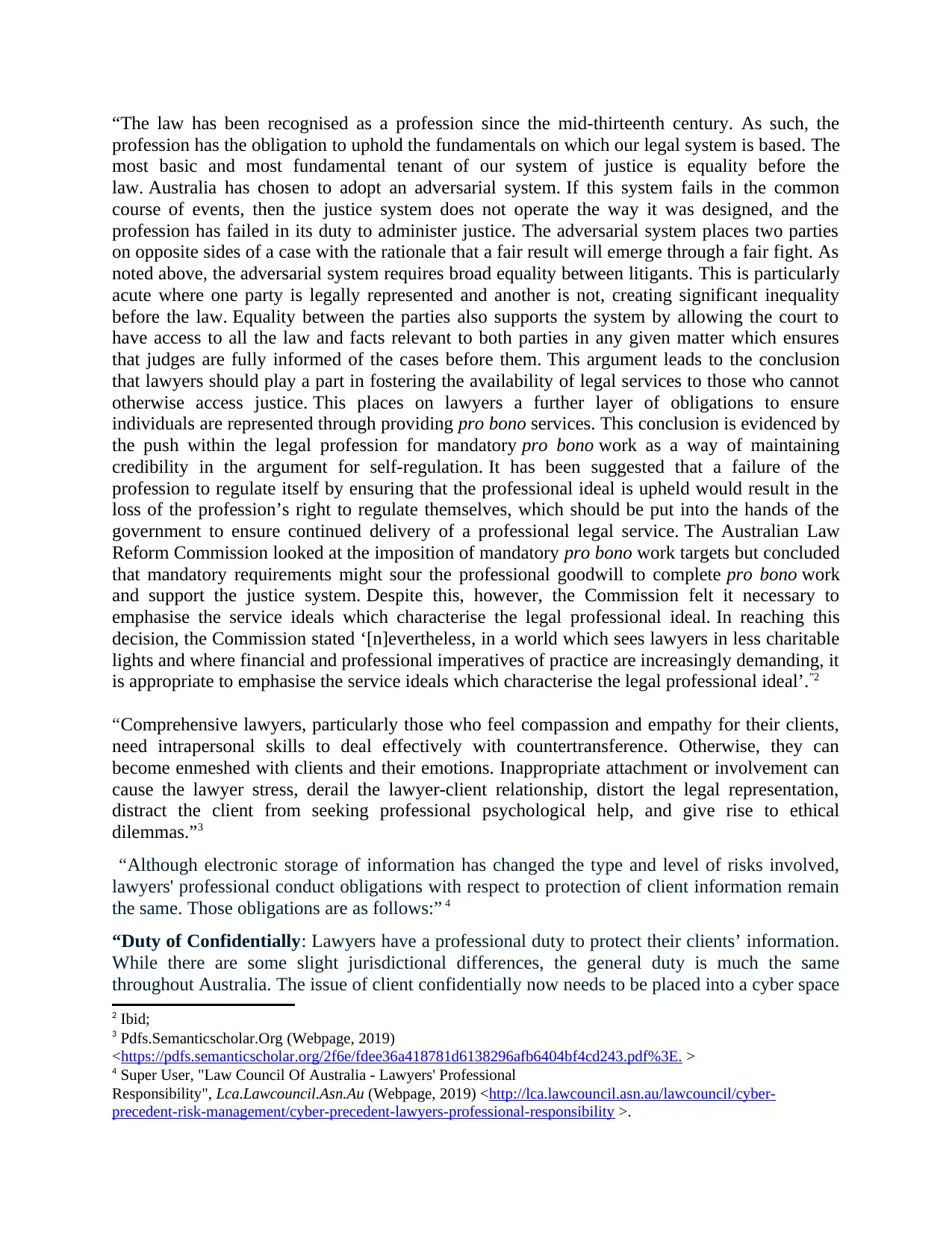
“The law has been recognised as a profession since the mid-thirteenth century. As such, the
profession has the obligation to uphold the fundamentals on which our legal system is based. The
most basic and most fundamental tenant of our system of justice is equality before the
law. Australia has chosen to adopt an adversarial system. If this system fails in the common
course of events, then the justice system does not operate the way it was designed, and the
profession has failed in its duty to administer justice. The adversarial system places two parties
on opposite sides of a case with the rationale that a fair result will emerge through a fair fight. As
noted above, the adversarial system requires broad equality between litigants. This is particularly
acute where one party is legally represented and another is not, creating significant inequality
before the law. Equality between the parties also supports the system by allowing the court to
have access to all the law and facts relevant to both parties in any given matter which ensures
that judges are fully informed of the cases before them. This argument leads to the conclusion
that lawyers should play a part in fostering the availability of legal services to those who cannot
otherwise access justice. This places on lawyers a further layer of obligations to ensure
individuals are represented through providing pro bono services. This conclusion is evidenced by
the push within the legal profession for mandatory pro bono work as a way of maintaining
credibility in the argument for self-regulation. It has been suggested that a failure of the
profession to regulate itself by ensuring that the professional ideal is upheld would result in the
loss of the profession’s right to regulate themselves, which should be put into the hands of the
government to ensure continued delivery of a professional legal service. The Australian Law
Reform Commission looked at the imposition of mandatory pro bono work targets but concluded
that mandatory requirements might sour the professional goodwill to complete pro bono work
and support the justice system. Despite this, however, the Commission felt it necessary to
emphasise the service ideals which characterise the legal professional ideal. In reaching this
decision, the Commission stated ‘[n]evertheless, in a world which sees lawyers in less charitable
lights and where financial and professional imperatives of practice are increasingly demanding, it
is appropriate to emphasise the service ideals which characterise the legal professional ideal’.”2
“Comprehensive lawyers, particularly those who feel compassion and empathy for their clients,
need intrapersonal skills to deal effectively with countertransference. Otherwise, they can
become enmeshed with clients and their emotions. Inappropriate attachment or involvement can
cause the lawyer stress, derail the lawyer-client relationship, distort the legal representation,
distract the client from seeking professional psychological help, and give rise to ethical
dilemmas.”3
“Although electronic storage of information has changed the type and level of risks involved,
lawyers' professional conduct obligations with respect to protection of client information remain
the same. Those obligations are as follows:” 4
“Duty of Confidentially: Lawyers have a professional duty to protect their clients’ information.
While there are some slight jurisdictional differences, the general duty is much the same
throughout Australia. The issue of client confidentially now needs to be placed into a cyber space
2 Ibid;
3 Pdfs.Semanticscholar.Org (Webpage, 2019)
<https://pdfs.semanticscholar.org/2f6e/fdee36a418781d6138296afb6404bf4cd243.pdf%3E. >
4 Super User, "Law Council Of Australia - Lawyers' Professional
Responsibility", Lca.Lawcouncil.Asn.Au (Webpage, 2019) <http://lca.lawcouncil.asn.au/lawcouncil/cyber-
precedent-risk-management/cyber-precedent-lawyers-professional-responsibility >.
profession has the obligation to uphold the fundamentals on which our legal system is based. The
most basic and most fundamental tenant of our system of justice is equality before the
law. Australia has chosen to adopt an adversarial system. If this system fails in the common
course of events, then the justice system does not operate the way it was designed, and the
profession has failed in its duty to administer justice. The adversarial system places two parties
on opposite sides of a case with the rationale that a fair result will emerge through a fair fight. As
noted above, the adversarial system requires broad equality between litigants. This is particularly
acute where one party is legally represented and another is not, creating significant inequality
before the law. Equality between the parties also supports the system by allowing the court to
have access to all the law and facts relevant to both parties in any given matter which ensures
that judges are fully informed of the cases before them. This argument leads to the conclusion
that lawyers should play a part in fostering the availability of legal services to those who cannot
otherwise access justice. This places on lawyers a further layer of obligations to ensure
individuals are represented through providing pro bono services. This conclusion is evidenced by
the push within the legal profession for mandatory pro bono work as a way of maintaining
credibility in the argument for self-regulation. It has been suggested that a failure of the
profession to regulate itself by ensuring that the professional ideal is upheld would result in the
loss of the profession’s right to regulate themselves, which should be put into the hands of the
government to ensure continued delivery of a professional legal service. The Australian Law
Reform Commission looked at the imposition of mandatory pro bono work targets but concluded
that mandatory requirements might sour the professional goodwill to complete pro bono work
and support the justice system. Despite this, however, the Commission felt it necessary to
emphasise the service ideals which characterise the legal professional ideal. In reaching this
decision, the Commission stated ‘[n]evertheless, in a world which sees lawyers in less charitable
lights and where financial and professional imperatives of practice are increasingly demanding, it
is appropriate to emphasise the service ideals which characterise the legal professional ideal’.”2
“Comprehensive lawyers, particularly those who feel compassion and empathy for their clients,
need intrapersonal skills to deal effectively with countertransference. Otherwise, they can
become enmeshed with clients and their emotions. Inappropriate attachment or involvement can
cause the lawyer stress, derail the lawyer-client relationship, distort the legal representation,
distract the client from seeking professional psychological help, and give rise to ethical
dilemmas.”3
“Although electronic storage of information has changed the type and level of risks involved,
lawyers' professional conduct obligations with respect to protection of client information remain
the same. Those obligations are as follows:” 4
“Duty of Confidentially: Lawyers have a professional duty to protect their clients’ information.
While there are some slight jurisdictional differences, the general duty is much the same
throughout Australia. The issue of client confidentially now needs to be placed into a cyber space
2 Ibid;
3 Pdfs.Semanticscholar.Org (Webpage, 2019)
<https://pdfs.semanticscholar.org/2f6e/fdee36a418781d6138296afb6404bf4cd243.pdf%3E. >
4 Super User, "Law Council Of Australia - Lawyers' Professional
Responsibility", Lca.Lawcouncil.Asn.Au (Webpage, 2019) <http://lca.lawcouncil.asn.au/lawcouncil/cyber-
precedent-risk-management/cyber-precedent-lawyers-professional-responsibility >.
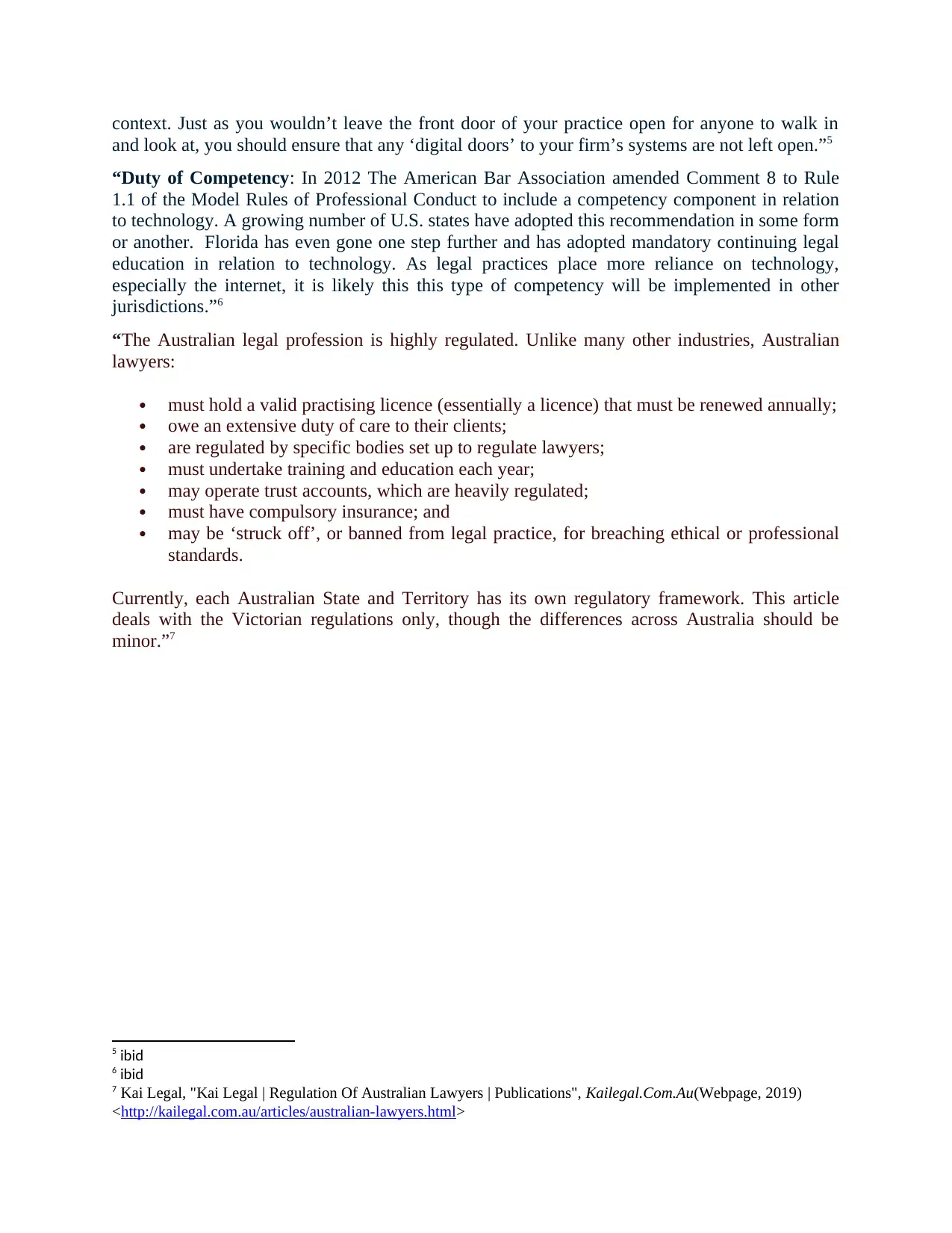
context. Just as you wouldn’t leave the front door of your practice open for anyone to walk in
and look at, you should ensure that any ‘digital doors’ to your firm’s systems are not left open.”5
“Duty of Competency: In 2012 The American Bar Association amended Comment 8 to Rule
1.1 of the Model Rules of Professional Conduct to include a competency component in relation
to technology. A growing number of U.S. states have adopted this recommendation in some form
or another. Florida has even gone one step further and has adopted mandatory continuing legal
education in relation to technology. As legal practices place more reliance on technology,
especially the internet, it is likely this this type of competency will be implemented in other
jurisdictions.”6
“The Australian legal profession is highly regulated. Unlike many other industries, Australian
lawyers:
must hold a valid practising licence (essentially a licence) that must be renewed annually;
owe an extensive duty of care to their clients;
are regulated by specific bodies set up to regulate lawyers;
must undertake training and education each year;
may operate trust accounts, which are heavily regulated;
must have compulsory insurance; and
may be ‘struck off’, or banned from legal practice, for breaching ethical or professional
standards.
Currently, each Australian State and Territory has its own regulatory framework. This article
deals with the Victorian regulations only, though the differences across Australia should be
minor.”7
5 ibid
6 ibid
7 Kai Legal, "Kai Legal | Regulation Of Australian Lawyers | Publications", Kailegal.Com.Au(Webpage, 2019)
<http://kailegal.com.au/articles/australian-lawyers.html>
and look at, you should ensure that any ‘digital doors’ to your firm’s systems are not left open.”5
“Duty of Competency: In 2012 The American Bar Association amended Comment 8 to Rule
1.1 of the Model Rules of Professional Conduct to include a competency component in relation
to technology. A growing number of U.S. states have adopted this recommendation in some form
or another. Florida has even gone one step further and has adopted mandatory continuing legal
education in relation to technology. As legal practices place more reliance on technology,
especially the internet, it is likely this this type of competency will be implemented in other
jurisdictions.”6
“The Australian legal profession is highly regulated. Unlike many other industries, Australian
lawyers:
must hold a valid practising licence (essentially a licence) that must be renewed annually;
owe an extensive duty of care to their clients;
are regulated by specific bodies set up to regulate lawyers;
must undertake training and education each year;
may operate trust accounts, which are heavily regulated;
must have compulsory insurance; and
may be ‘struck off’, or banned from legal practice, for breaching ethical or professional
standards.
Currently, each Australian State and Territory has its own regulatory framework. This article
deals with the Victorian regulations only, though the differences across Australia should be
minor.”7
5 ibid
6 ibid
7 Kai Legal, "Kai Legal | Regulation Of Australian Lawyers | Publications", Kailegal.Com.Au(Webpage, 2019)
<http://kailegal.com.au/articles/australian-lawyers.html>
⊘ This is a preview!⊘
Do you want full access?
Subscribe today to unlock all pages.

Trusted by 1+ million students worldwide
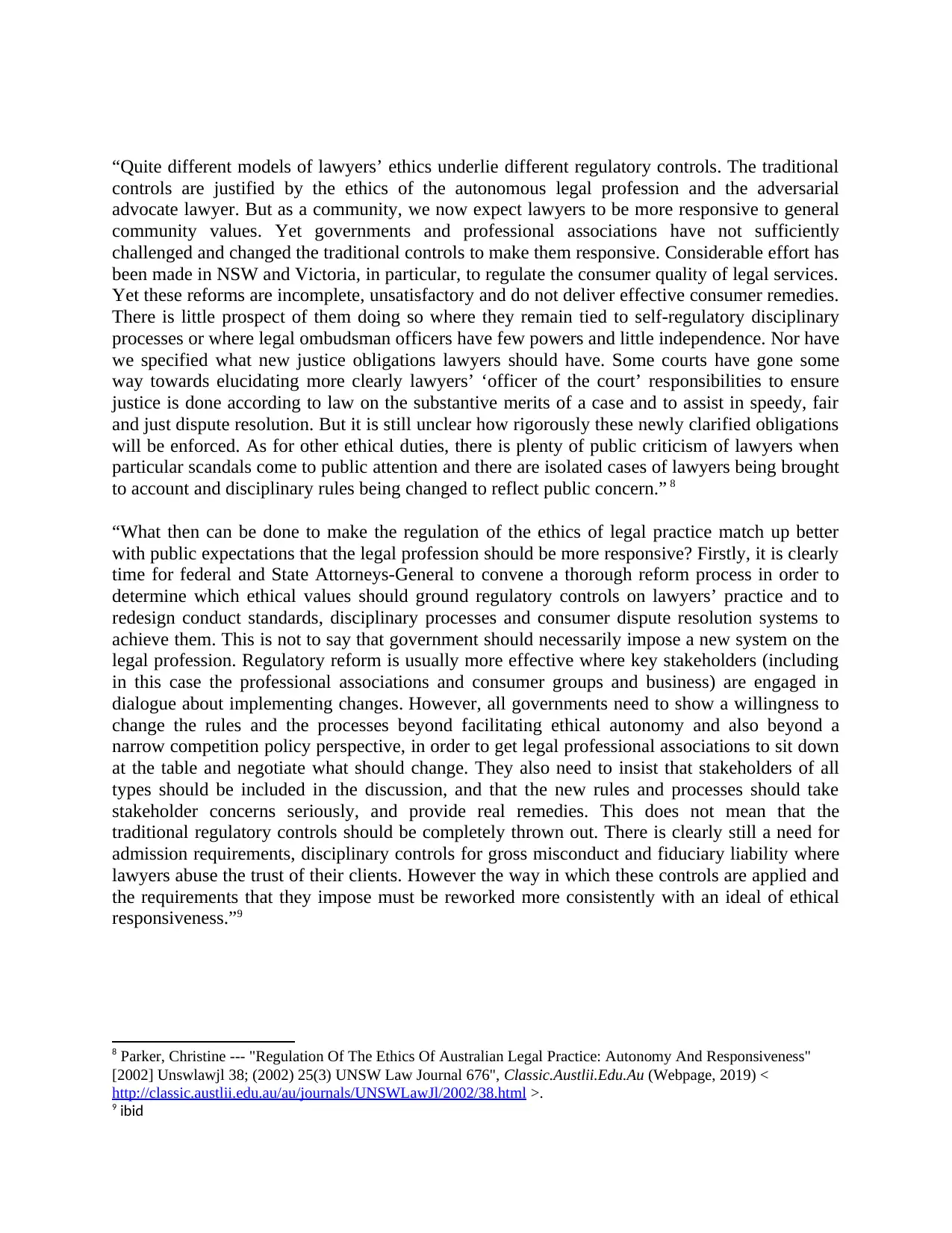
“Quite different models of lawyers’ ethics underlie different regulatory controls. The traditional
controls are justified by the ethics of the autonomous legal profession and the adversarial
advocate lawyer. But as a community, we now expect lawyers to be more responsive to general
community values. Yet governments and professional associations have not sufficiently
challenged and changed the traditional controls to make them responsive. Considerable effort has
been made in NSW and Victoria, in particular, to regulate the consumer quality of legal services.
Yet these reforms are incomplete, unsatisfactory and do not deliver effective consumer remedies.
There is little prospect of them doing so where they remain tied to self-regulatory disciplinary
processes or where legal ombudsman officers have few powers and little independence. Nor have
we specified what new justice obligations lawyers should have. Some courts have gone some
way towards elucidating more clearly lawyers’ ‘officer of the court’ responsibilities to ensure
justice is done according to law on the substantive merits of a case and to assist in speedy, fair
and just dispute resolution. But it is still unclear how rigorously these newly clarified obligations
will be enforced. As for other ethical duties, there is plenty of public criticism of lawyers when
particular scandals come to public attention and there are isolated cases of lawyers being brought
to account and disciplinary rules being changed to reflect public concern.” 8
“What then can be done to make the regulation of the ethics of legal practice match up better
with public expectations that the legal profession should be more responsive? Firstly, it is clearly
time for federal and State Attorneys-General to convene a thorough reform process in order to
determine which ethical values should ground regulatory controls on lawyers’ practice and to
redesign conduct standards, disciplinary processes and consumer dispute resolution systems to
achieve them. This is not to say that government should necessarily impose a new system on the
legal profession. Regulatory reform is usually more effective where key stakeholders (including
in this case the professional associations and consumer groups and business) are engaged in
dialogue about implementing changes. However, all governments need to show a willingness to
change the rules and the processes beyond facilitating ethical autonomy and also beyond a
narrow competition policy perspective, in order to get legal professional associations to sit down
at the table and negotiate what should change. They also need to insist that stakeholders of all
types should be included in the discussion, and that the new rules and processes should take
stakeholder concerns seriously, and provide real remedies. This does not mean that the
traditional regulatory controls should be completely thrown out. There is clearly still a need for
admission requirements, disciplinary controls for gross misconduct and fiduciary liability where
lawyers abuse the trust of their clients. However the way in which these controls are applied and
the requirements that they impose must be reworked more consistently with an ideal of ethical
responsiveness.”9
8 Parker, Christine --- "Regulation Of The Ethics Of Australian Legal Practice: Autonomy And Responsiveness"
[2002] Unswlawjl 38; (2002) 25(3) UNSW Law Journal 676", Classic.Austlii.Edu.Au (Webpage, 2019) <
http://classic.austlii.edu.au/au/journals/UNSWLawJl/2002/38.html >.
9 ibid
controls are justified by the ethics of the autonomous legal profession and the adversarial
advocate lawyer. But as a community, we now expect lawyers to be more responsive to general
community values. Yet governments and professional associations have not sufficiently
challenged and changed the traditional controls to make them responsive. Considerable effort has
been made in NSW and Victoria, in particular, to regulate the consumer quality of legal services.
Yet these reforms are incomplete, unsatisfactory and do not deliver effective consumer remedies.
There is little prospect of them doing so where they remain tied to self-regulatory disciplinary
processes or where legal ombudsman officers have few powers and little independence. Nor have
we specified what new justice obligations lawyers should have. Some courts have gone some
way towards elucidating more clearly lawyers’ ‘officer of the court’ responsibilities to ensure
justice is done according to law on the substantive merits of a case and to assist in speedy, fair
and just dispute resolution. But it is still unclear how rigorously these newly clarified obligations
will be enforced. As for other ethical duties, there is plenty of public criticism of lawyers when
particular scandals come to public attention and there are isolated cases of lawyers being brought
to account and disciplinary rules being changed to reflect public concern.” 8
“What then can be done to make the regulation of the ethics of legal practice match up better
with public expectations that the legal profession should be more responsive? Firstly, it is clearly
time for federal and State Attorneys-General to convene a thorough reform process in order to
determine which ethical values should ground regulatory controls on lawyers’ practice and to
redesign conduct standards, disciplinary processes and consumer dispute resolution systems to
achieve them. This is not to say that government should necessarily impose a new system on the
legal profession. Regulatory reform is usually more effective where key stakeholders (including
in this case the professional associations and consumer groups and business) are engaged in
dialogue about implementing changes. However, all governments need to show a willingness to
change the rules and the processes beyond facilitating ethical autonomy and also beyond a
narrow competition policy perspective, in order to get legal professional associations to sit down
at the table and negotiate what should change. They also need to insist that stakeholders of all
types should be included in the discussion, and that the new rules and processes should take
stakeholder concerns seriously, and provide real remedies. This does not mean that the
traditional regulatory controls should be completely thrown out. There is clearly still a need for
admission requirements, disciplinary controls for gross misconduct and fiduciary liability where
lawyers abuse the trust of their clients. However the way in which these controls are applied and
the requirements that they impose must be reworked more consistently with an ideal of ethical
responsiveness.”9
8 Parker, Christine --- "Regulation Of The Ethics Of Australian Legal Practice: Autonomy And Responsiveness"
[2002] Unswlawjl 38; (2002) 25(3) UNSW Law Journal 676", Classic.Austlii.Edu.Au (Webpage, 2019) <
http://classic.austlii.edu.au/au/journals/UNSWLawJl/2002/38.html >.
9 ibid
Paraphrase This Document
Need a fresh take? Get an instant paraphrase of this document with our AI Paraphraser
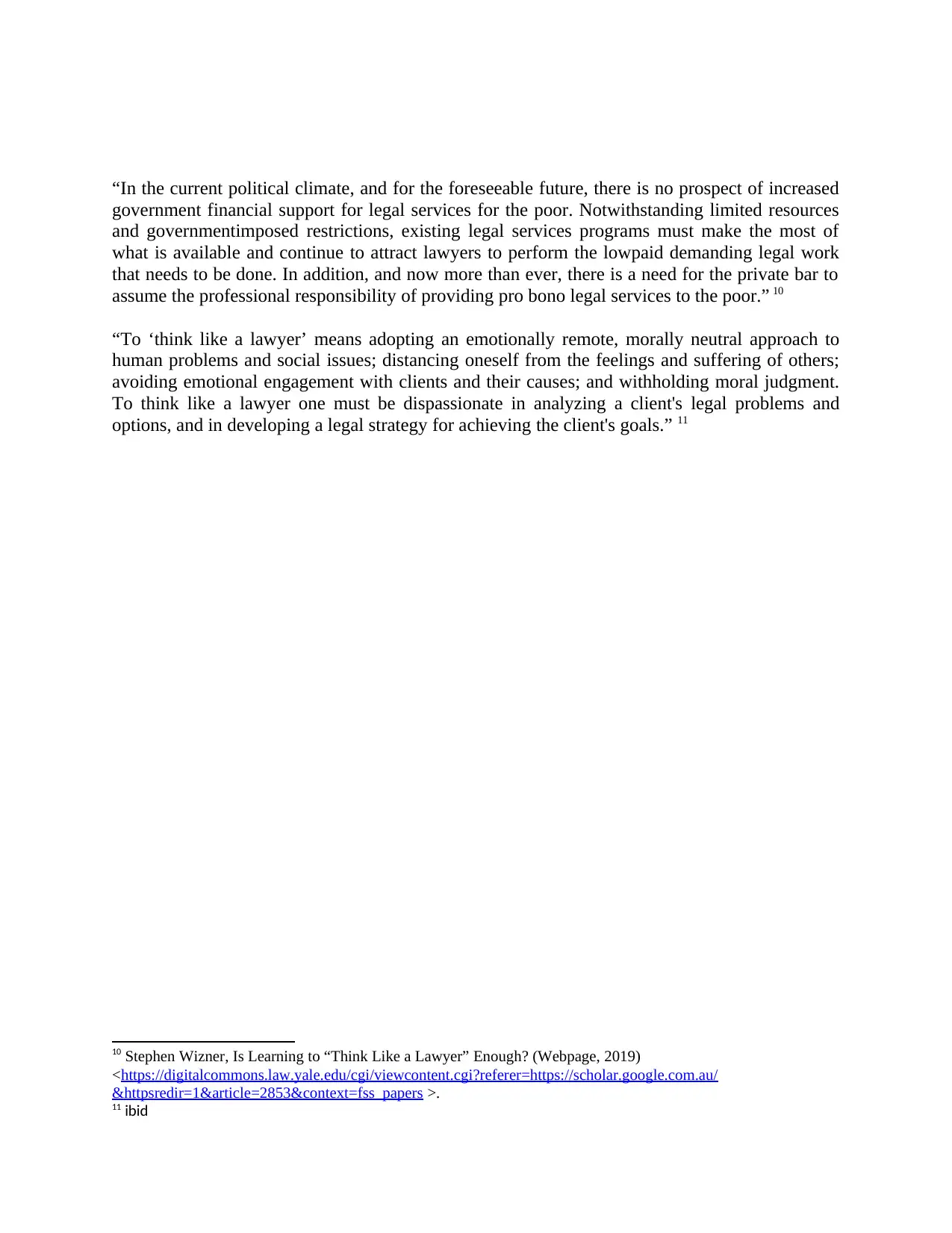
“In the current political climate, and for the foreseeable future, there is no prospect of increased
government financial support for legal services for the poor. Notwithstanding limited resources
and governmentimposed restrictions, existing legal services programs must make the most of
what is available and continue to attract lawyers to perform the lowpaid demanding legal work
that needs to be done. In addition, and now more than ever, there is a need for the private bar to
assume the professional responsibility of providing pro bono legal services to the poor.” 10
“To ‘think like a lawyer’ means adopting an emotionally remote, morally neutral approach to
human problems and social issues; distancing oneself from the feelings and suffering of others;
avoiding emotional engagement with clients and their causes; and withholding moral judgment.
To think like a lawyer one must be dispassionate in analyzing a client's legal problems and
options, and in developing a legal strategy for achieving the client's goals.” 11
10 Stephen Wizner, Is Learning to “Think Like a Lawyer” Enough? (Webpage, 2019)
<https://digitalcommons.law.yale.edu/cgi/viewcontent.cgi?referer=https://scholar.google.com.au/
&httpsredir=1&article=2853&context=fss_papers >.
11 ibid
government financial support for legal services for the poor. Notwithstanding limited resources
and governmentimposed restrictions, existing legal services programs must make the most of
what is available and continue to attract lawyers to perform the lowpaid demanding legal work
that needs to be done. In addition, and now more than ever, there is a need for the private bar to
assume the professional responsibility of providing pro bono legal services to the poor.” 10
“To ‘think like a lawyer’ means adopting an emotionally remote, morally neutral approach to
human problems and social issues; distancing oneself from the feelings and suffering of others;
avoiding emotional engagement with clients and their causes; and withholding moral judgment.
To think like a lawyer one must be dispassionate in analyzing a client's legal problems and
options, and in developing a legal strategy for achieving the client's goals.” 11
10 Stephen Wizner, Is Learning to “Think Like a Lawyer” Enough? (Webpage, 2019)
<https://digitalcommons.law.yale.edu/cgi/viewcontent.cgi?referer=https://scholar.google.com.au/
&httpsredir=1&article=2853&context=fss_papers >.
11 ibid
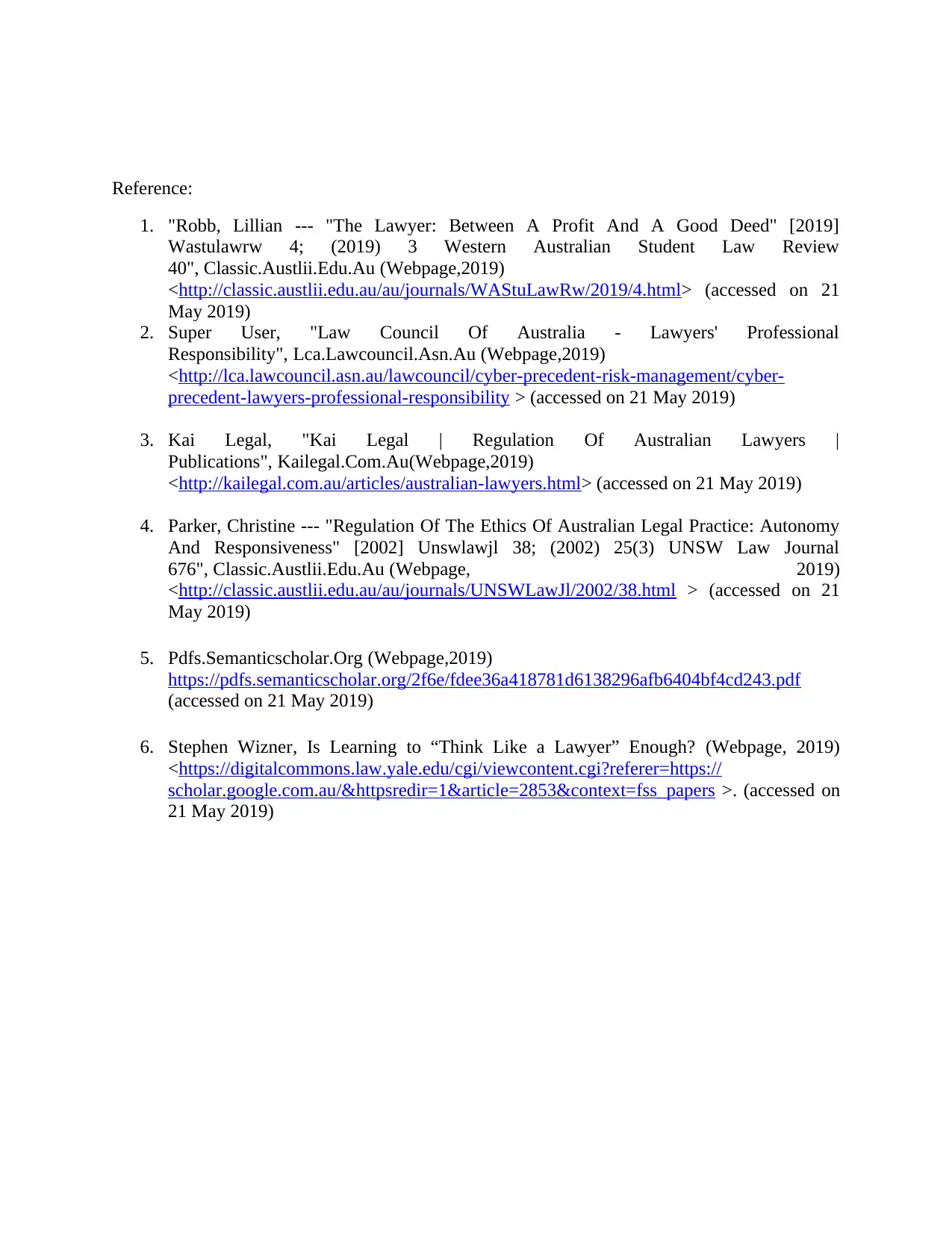
Reference:
1. "Robb, Lillian --- "The Lawyer: Between A Profit And A Good Deed" [2019]
Wastulawrw 4; (2019) 3 Western Australian Student Law Review
40", Classic.Austlii.Edu.Au (Webpage,2019)
<http://classic.austlii.edu.au/au/journals/WAStuLawRw/2019/4.html> (accessed on 21
May 2019)
2. Super User, "Law Council Of Australia - Lawyers' Professional
Responsibility", Lca.Lawcouncil.Asn.Au (Webpage,2019)
<http://lca.lawcouncil.asn.au/lawcouncil/cyber-precedent-risk-management/cyber-
precedent-lawyers-professional-responsibility > (accessed on 21 May 2019)
3. Kai Legal, "Kai Legal | Regulation Of Australian Lawyers |
Publications", Kailegal.Com.Au(Webpage,2019)
<http://kailegal.com.au/articles/australian-lawyers.html> (accessed on 21 May 2019)
4. Parker, Christine --- "Regulation Of The Ethics Of Australian Legal Practice: Autonomy
And Responsiveness" [2002] Unswlawjl 38; (2002) 25(3) UNSW Law Journal
676", Classic.Austlii.Edu.Au (Webpage, 2019)
<http://classic.austlii.edu.au/au/journals/UNSWLawJl/2002/38.html > (accessed on 21
May 2019)
5. Pdfs.Semanticscholar.Org (Webpage,2019)
https://pdfs.semanticscholar.org/2f6e/fdee36a418781d6138296afb6404bf4cd243.pdf
(accessed on 21 May 2019)
6. Stephen Wizner, Is Learning to “Think Like a Lawyer” Enough? (Webpage, 2019)
<https://digitalcommons.law.yale.edu/cgi/viewcontent.cgi?referer=https://
scholar.google.com.au/&httpsredir=1&article=2853&context=fss_papers >. (accessed on
21 May 2019)
1. "Robb, Lillian --- "The Lawyer: Between A Profit And A Good Deed" [2019]
Wastulawrw 4; (2019) 3 Western Australian Student Law Review
40", Classic.Austlii.Edu.Au (Webpage,2019)
<http://classic.austlii.edu.au/au/journals/WAStuLawRw/2019/4.html> (accessed on 21
May 2019)
2. Super User, "Law Council Of Australia - Lawyers' Professional
Responsibility", Lca.Lawcouncil.Asn.Au (Webpage,2019)
<http://lca.lawcouncil.asn.au/lawcouncil/cyber-precedent-risk-management/cyber-
precedent-lawyers-professional-responsibility > (accessed on 21 May 2019)
3. Kai Legal, "Kai Legal | Regulation Of Australian Lawyers |
Publications", Kailegal.Com.Au(Webpage,2019)
<http://kailegal.com.au/articles/australian-lawyers.html> (accessed on 21 May 2019)
4. Parker, Christine --- "Regulation Of The Ethics Of Australian Legal Practice: Autonomy
And Responsiveness" [2002] Unswlawjl 38; (2002) 25(3) UNSW Law Journal
676", Classic.Austlii.Edu.Au (Webpage, 2019)
<http://classic.austlii.edu.au/au/journals/UNSWLawJl/2002/38.html > (accessed on 21
May 2019)
5. Pdfs.Semanticscholar.Org (Webpage,2019)
https://pdfs.semanticscholar.org/2f6e/fdee36a418781d6138296afb6404bf4cd243.pdf
(accessed on 21 May 2019)
6. Stephen Wizner, Is Learning to “Think Like a Lawyer” Enough? (Webpage, 2019)
<https://digitalcommons.law.yale.edu/cgi/viewcontent.cgi?referer=https://
scholar.google.com.au/&httpsredir=1&article=2853&context=fss_papers >. (accessed on
21 May 2019)
⊘ This is a preview!⊘
Do you want full access?
Subscribe today to unlock all pages.

Trusted by 1+ million students worldwide
1 out of 6
Related Documents
Your All-in-One AI-Powered Toolkit for Academic Success.
+13062052269
info@desklib.com
Available 24*7 on WhatsApp / Email
![[object Object]](/_next/static/media/star-bottom.7253800d.svg)
Unlock your academic potential
Copyright © 2020–2025 A2Z Services. All Rights Reserved. Developed and managed by ZUCOL.





